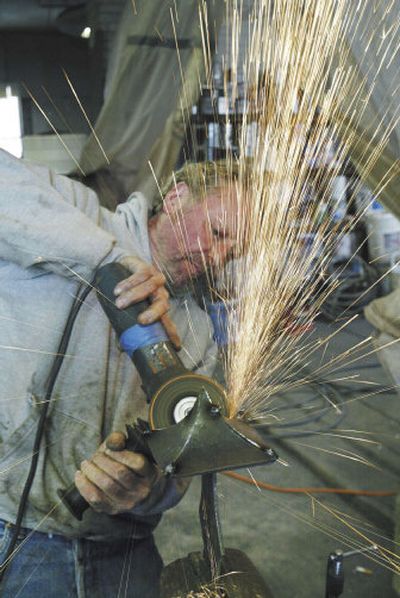In Butte, artist sees potential for beauty

BUTTE – John Richen views Butte with an artist’s eye. In crumbling buildings, he sees architectural masterpieces. In scrap metal, he sees a sculptor’s medium. In boarded storefronts, he sees shops, restaurants and studios.
Beauty is in the eye of the beholder – as artists know well – and Butte, Richen said, looks like paradise.
“During the summer, I sit out on my front porch and I just smile because I know this is the best place for me at this point in my life,” said Richen, 57, seated in the dining room of his Dodge Bros. Saloon & Eatery.
An architect by training, a sculptor by trade, Richen’s vision for an upscale restaurant in the once-crumbling Park Hotel took Butte by surprise when it opened in November.
“People looked at that building and said, ‘It’s ready for the wrecking ball,’ ” said Karen Byrnes, county community development director. “He looked at that building and saw the burnt timbers and saw the collapsed floors and said, ‘I can do something with this.’ ”
Those who know him said Richen’s ability to see beauty veiled in rubble and convention is a hallmark not only of the artist but also of the man.
“He can take nothing and turn it into something,” said Jack Krauss, owner of Whitt Krauss Gallery in San Diego, which shows Richen’s sculptures.
In the entryway of the Dodge Bros. restaurant, a shiny fan turns below a sculpted panel depicting a mining scene. Along with light fixtures and wine cellar doors, the fan is a sample of Richen’s handiwork.
“I love putting things together,” Richen said.
Richen’s appearance reflects a tendency toward manual labor. He’s most often seen in carpenter’s pants, long-sleeved work shirts and waffle-soled boots.
An Oregon native, he was raised on a Willamette Valley farm, where his parents grew hazelnuts and holly.
His father was also an engineer whose resume included designing the Bonneville Dam. Richen’s mother, who he said emphasized culture and creativity, ran the farm and raised three children.
Motivated by a drive to design and build, Richen studied architecture at Oregon State University, where he discovered sculpting accidentally.
“As I progressed and took classes, I did a lot of sculpture,” he said. “I wanted to build what I created.” At an art show his senior year, to his own surprise, he said, every piece sold.
“I spent the whole next summer sculpting on the farm,” he said.
He followed his sculpting career to Seattle and later California, eventually taking on large-scale commercial jobs, such as work for Princess Cruise Lines.
In his 30s, Richen was a successful sculptor and the divorced father of two sons, Kevin and Paul, when he happened upon a booth in a mall providing information on foreign adoptions.
One thing led to another, and he later adopted two sons from Brazil: Luiz and Valdier. He eventually adopted three more boys from South America: Rodrigo, Rogierio and Thiago.
“You pass along your good fortune,” Richen said. “I felt like I was a good dad and I could handle more children.”
Stumbling upon opportunities has been a theme for Richen; it’s how he discovered sculpture, adoption – and Butte.
On his way to Chicago to install a sculpture in 1994, he made a rest stop here.
“I just fell in love with Butte,” he said. “I came back time and time again.” And he continually invested, until he owned 18 Butte buildings, including the Park Hotel and its neighbor, the Berkshire, home to the Dodge Bros. Cafe.
“I was getting a little worn out from sculpting,” he said. “I thought, ‘If you’ve got that (building), you’ve got to have this one.’ ” Along with opportunity and creative inspiration, he found another gem here, he said.
“You just couldn’t find a better group of people more appreciative, more friendly, and the diversity of culture. Everybody who comes here, my friends, say the same thing.” He points to the response to the Dodge Bros. Cafe as an example of Butte’s warm welcome.
“We had 400 people the first weekend,” he said. “People would come by and say ‘thank you for opening.’ People would bring us memorabilia on Dodge Bros. That is so, so Butte.” And the public’s reaction to his restaurant has been inspiring, he said.
“You put art up on a wall or in a fountain, and you watch the way people respond,” he said. It pushes you to the next level. I already see … how my work is changing.”